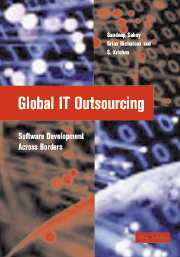Book contents
- Frontmatter
- Contents
- List of figures
- List of tables
- List of boxes
- Foreword
- Acknowledgements
- List of abbreviations
- 1 Introducing the phenomenon of global software work
- 2 Globalization and global software work
- 3 GlobTel's GSA programme in India
- 4 The GlobTel–Witech relationship: a ‘standardization’ perspective
- 5 Global software work: an identity perspective
- 6 The GlobTel–MCI relationship: the dialectics of space and place
- 7 Managing the knowledge transfer process: the case of Sierra and its Indian subsidiary
- 8 The case of Gowing and Eron GSA: power and control
- 9 Cross-cultural communication challenges: GSAs between Japanese and Indian firms
- 10 Reflections and synthesis on theoretical insights
- 11 Managerial implications
- Index
- References
8 - The case of Gowing and Eron GSA: power and control
Published online by Cambridge University Press: 14 January 2010
- Frontmatter
- Contents
- List of figures
- List of tables
- List of boxes
- Foreword
- Acknowledgements
- List of abbreviations
- 1 Introducing the phenomenon of global software work
- 2 Globalization and global software work
- 3 GlobTel's GSA programme in India
- 4 The GlobTel–Witech relationship: a ‘standardization’ perspective
- 5 Global software work: an identity perspective
- 6 The GlobTel–MCI relationship: the dialectics of space and place
- 7 Managing the knowledge transfer process: the case of Sierra and its Indian subsidiary
- 8 The case of Gowing and Eron GSA: power and control
- 9 Cross-cultural communication challenges: GSAs between Japanese and Indian firms
- 10 Reflections and synthesis on theoretical insights
- 11 Managerial implications
- Index
- References
Summary
GSW: a power and control perspective
In this chapter, we examine the role of power and control in shaping the process of a GSA relationship over time. In society and also in an organization, issues of power and control are intrinsically inter-connected with culture. Power has an influence on how cultural norms are collectively defined. The exercise of this power must be based on existing cultural values and assumptions. The exercise of power also enables the production and reproduction of cultural values. The process of globalization that defines the working of a GSA introduces new dimensions of power. Power structures that have been historically shaped – for example, through relationships between developed and developing countries – come into play in different ways and levels when firms from these countries are drawn together in a GSA. MNCs typically situated in the developed world have the economic and political power to make investments in infrastructure required for running GSAs. This economic power is also translated into cultural values, such as the norms of communication and conventions of meetings, etc. However, the introduction and stabilization of power- and culture-related values are always contested, especially in GSAs where the linkage between the firms is through the aspect of ‘knowledge’.
Power and knowledge are also deeply inter-connected, a point made emphatically by Foucault (1991). Three key strands in Foucault's analysis relate to power, knowledge and discourse.
- Type
- Chapter
- Information
- Global IT OutsourcingSoftware Development across Borders, pp. 155 - 175Publisher: Cambridge University PressPrint publication year: 2003



